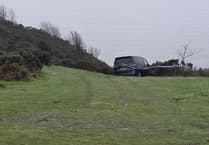ADDITIONAL water restrictions were still not needed across Exmoor and West Somerset despite the Environment Agency (EA) this week officially declaring the whole of the Westcountry to be suffering drought conditions.
The announcement came as water levels in Wimbleball Lake fell this week to a lowest-ever 39.5 per cent, the previous worst being 46 per cent in 1995.
South West Water has had a hosepipe ban in place since last week, and said the EA drought declaration would not have any further impact.
Wessex Water said it did not need to introduce any restrictions because it had sufficient supplies of groundwater.
The EA said Somerset, Dorset, Bristol, South Gloucestershire, and parts of Wiltshire had all moved to drought status because of the impact on the environment of the prolonged dry weather.
Previously, Devon, Cornwall, and the Isles of Scilly had also been declared to be in a drought as the West Country experienced some of the driest conditions in nearly 90 years.
The EA said triggers used to confirm the move to drought status included rainfall, river flows, groundwater levels, reservoir levels, and the dryness of soils.
By waiting until this week it had given the agency’s response team time to consider the effects of recent rainfall.
EA area drought lead Chris Paul said: “Despite some heavy rain over the past two weeks it has not been enough to refill our rivers and aquifers. River levels across our Wessex area are exceptionally low, many showing the lowest flows on record.
“This places incredible strain on local wildlife and this is why we are moving to drought status.
“We are prioritising our local operations to minimise impacts on the environment.”
But Wessex Water spokesman George Keast told the Free Press: “Our drinking water levels remain stable and we have seen a significant drop in demand for water compared to previous dry weather periods, so we have no plans to introduce a hosepipe ban.
“We urge everyone to continue using water responsibly, even now that temperatures are cooling, because our rivers and wildlife need protection.
“By taking shorter showers, fixing any leaking toilets or taps, and reusing water where possible on plants, we can all do our bit to help the environment.
“Throughout the summer we have been keeping rivers and streams ‘topped up’ with 90 million litres of water per day that we are able to pump up from groundwater sources.”
Mr Keast said the water company was also fixing 1,200 leaks every month and had reduced leakage by 30 per cent in the past 20 years, which had helped to ease demand despite a 12 per cent increase in population.



-has-been-sent-to-prison-for-his-role-in-Just-Stop-Oi.jpeg?width=209&height=140&crop=209:145,smart&quality=75)
-Chloe-Hadjimatheou-Rachel-Jo.jpeg?width=209&height=140&crop=209:145,smart&quality=75)
Comments
This article has no comments yet. Be the first to leave a comment.